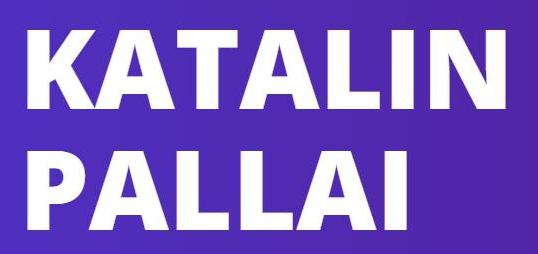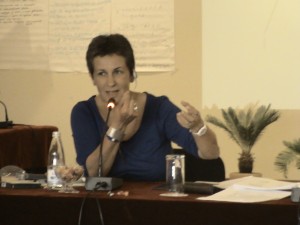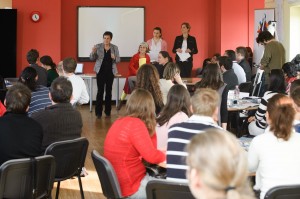 Accredited Mediator Training.
Accredited Mediator Training.
Course designer and trainer, Scientific University of Szeged 2012
The training offers a curriculum for mediators that covers the full range of subjects required for their licensing in Hungary. It is a training whose successful accomplishment is automatically accepted by the Ministry of Justice as the fulfillment of training requirement for mediators. It consist of 60 training hours and practicum. I developed and lead it with one colleague.
Leadership Academy. (Hungarian Program)
Lead expert and trainer, since 2011
The program offers nine month long leadership education for Hungarian local government leaders. It is an adapted version of the Council of Europe Leadership Academy program. The aim of the program is to offer a framework for the analysis of the actual municipal performance and initiate reflection on possible improvements; to assist leaders to learn how to say yes to challenges, how to release leadership capacities in others and how to create an environment in which others want to work with them, share their purpose and follow their lead. The program is implemented in Hungary in cooperation with the Hungarian Association of Local Governments. On a joint appointment of the two implementing organization I am commissioned to be the lead expert whose duties are: adaptation of the methodology, elaboration of training materials, delivery of training and coaching for the participating decision makers.
Leadership Academy. in Bulgaria, Ukraine, Montenegro
Trainer and coach of local trainers, since 2011
The aim of the program is to assist leaders to learn how to build effective organizations and release leadership capacities in others, and how to create an environment in which others want to work with them, share their purpose and follow their lead. My role in these countries is to act as trainer during the first cycle of presentation and/or act as mentor and coach local trainers while they gain expertise to lead the program in their own countries.
Renewal of the urban planning system of Pécs.
Process adviser, Varoskooperacio, since 2011
In the city of Pécs a civil initiative, Városkooperáció, was formed to initiate public dialogue on urban planning, create communication channels among local stakeholders and decision makers in order to create a wide dialogue on a new city strategy and the renewal of the local planning system and process. This initiative asked me to advise the Board of the initiative and help facilitating the process and the events.
Multi-stakeholder Alternative Dispute Resolution Processes.
guest professor, National Public Service University, since 2011
The course offers an introduction to multiparty disputes. It shows how can be alternative dispute resolution methods applied in multi-stakeholder processes, how can representation be organized, and how can collaborative problem solving and conflict resolution processes facilitated and led to sound and sustainable solutions. The course presents the theoretical underpinnings to both multi-stakeholder processes and conflict resolution, involves participants in various exercises and practical challenges, and initiates in depth discussion on professionally and politically correct process design and facilitation. The course is presented for MA level in English and parts of it are also presented in Hungarian in the frame of post-graduate education.
Alternative Dispute Resolution in Schools
Mentor mediator, Education Research and Development Institute, 2011
I worked in the frame of the multi year project “Alternative Dispute Resolution: the introduction of interest-based and restorative processes in schools.” My duties were the following: advice on project development, process management and professional decisions of the project management, support of teachers and mediators trained by the project to start practice (mentoring, case discussion and analysis, co-mediation supervision) Planning and leading activities in schools that support the introduction of AVR approaches in school activities, routines and procedures.
Leadership Academy
Trainer of trainers, expert for national adaptations and trainer, Council of Europe, 2011
The program offers nine month long education for local government leaders. Its central theme is that every person has leadership capabilities that can be released and enhanced. One aim of the program is to offer a framework for the analysis of the actual municipal performance and initiate reflection on possible improvements. The other, and key, purpose of the program is to assist leaders to learn how to say yes to challenges, how to release leadership capacities in others and how to create an environment in which others want to work with them, share their purpose and follow their lead. This is a multi-country program of the Council of Europe. In 2011 spring with a colleague we trained the teams of trainers for five countries. The plan is that I will lead the Hungarian adaptation and delivery of the program and assist some of the other country teams in their adaptation and delivery.
 Civil initiative for saving a school, 2011
Civil initiative for saving a school, 2011
Although this was not a contracted job, I include it in my professional experience as it was a community building and participatory problem solving process, like the ones I am often hired to support. Being ‘not only’ an adviser but also a member of the group made the experience special. The foundation that provided the school of my child announced one month before the enrollment for first graders that the school would be closed. During the month following the decision I led a process that built a strong community of the families of the kids in the school, maintained them together, valorized the community as a strong negotiating partner with the local government and other foundations that were possible candidates for taking over and we went through recruitment, selection and agreement building for a new provider. During the insecurity the process could not only keep most families together (including first grades for the following academic year) but also encouraged new families to join the community.
Public participation in multi-ethnic local governments
Research and course manual writing. LGI/Open Society Institute, 2011
In jurisdictions where different ethnic groups share a place where they live, and the conceptualization of some local affairs is differentiated along ethnic lines participation of stakeholders in the policy process is essential to building sustainable and just local societies. The manual discusses how public participation can be de-signed and managed in multi-ethnic contexts in a manner that it can support the implementation of the policy goals set by the local political community. The manual presents the key terms and concepts and the most important body of practical knowledge on local public participation, and examines the specific consequences of the multi-ethnic environment on the design and implementation of participatory mechanisms.
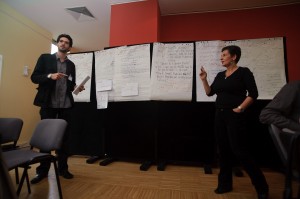 Built heritage in local governance
Built heritage in local governance
Distance learning course devel-opment. ISES (In-stitute for European and Social Studies), 2011
Distance learning course in the frame of the post graduate Cultural Heritage Management Program of the Institute for Social & European Studies (ISES) and Corvinus University, Budapest. The purpose of the course is to discuss the implications of heritage and conservation practices to the local context, with focus on the social and political dimen-sions, and to discuss deliberative democratic processes that can support the heritage management. Key themes are the role of heritage in place making and the negotiations related to heritage within the local political community. By the end of the course students become able to recognize the possibilities that different participatory mechanisms can offer for the negotiation and collaboration of stakeholders, and with this knowledge and skills they will improve their capacity to engage in effective and collaborative negotiation with other stakeholders about the local built heritage.
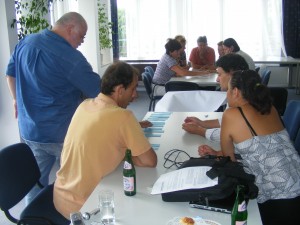 Public participation in local governance
Public participation in local governance
Course designer and trainer, Academy for Mayors, 2010-2011
The Academy for Mayors was established by the Corvinus University and the Associa-tion of Hungarian Local governments with the support offered by the Norwegian bilateral funds. Within the frame of the Academy the elected decision makers receive a one year long post graduate education. After the success of our mediation course designed for the first year of the program, I received an invitation to elaborate a module on public participation. The course is focused on those practical considerations and competencies that decision makers need to have in order to make wise decisions on and fulfill their role in local participatory processes. The discussion of the basic concepts and methods are connected to concrete cases and widely used practices. The cases are also the starting points for the discussion of possible decision criteria, dilemmas, costs and benefits of participatory processes.
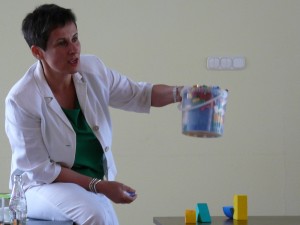 Mediation: Conflict management and resolution
Mediation: Conflict management and resolution
Course designer and trainer, Academy for Mayors, 2009-2011
The Academy for Mayors was established by the Corvinus University and the Association of Hungarian Local governments with the support offered by the Norwegian bilateral funds. Within the frame of the Academy Mayors a one year long post graduate education is offered for the elected decision makers. During the first year of the program I was commissioned (with a colleague) to elaborate a module on the management of conflicts related to local issues and inter-municipal disputes. The tasks were the preparation of a textbook for the participants and a teaching method for conflict resolution. The module was based on experience-based training technique. Its components included, practical exercises, skill building elements, case study analysis, discussions and short conceptual and knowledge components. After the success of the course during the first year, we recieved an invitation for an extended version for the second year.
Mentoring Municipalities in Roma Education
Lead expert in training design and trainer of trainers, Open So-ciety Insti-tute and Roma Education Fund, 2010
The Roma Education Fund supports the DILS project whose goal is to support local governments and stakeholders in developing and implementing an integrated enrollment policy and system support for the successful education of Roma children – from the preparatory pre-school education onwards – incorporated in the Local Action Plans for Roma education. One component of the program was to train Mentors to work with local governments and support the elaboration and implementation of integration strategies and policies. My role was to supervise the design and elaboration of the materials for the training of the mentors, and to train the Serbian speaking trainers who were commissioned with the training of mentors.
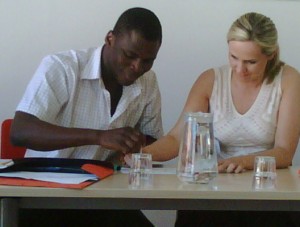 Minority rights and local governance
Minority rights and local governance
Course designer and trainer, Open Society Institute, Management of Multi-Ethnic Communities Program, 2009 and 2010
This course focused on local political opportunities (and limitations) in the accommodation of the needs and aspirations of ethno cultural minorities with a special interest in the normative dimension. Of the numerous inter-nationally granted minority rights, this course centered on ‘public participation’, since this is regarded as a foundational minority right, that is a right that is essential for the realization of other minority rights. The course discussed existing local multicultural policies and practices in order to identify the major issues and dilemmas in the local management of ethnocultural diversity. In order to understand these issues and dilemmas, various (often overlapping) aspects of the local political opportunities were ana-lyzed that can enable or block the local accommodation of ethno cultural diversity.
Heritage protection in urban management
Course designer and visiting professor, Institute for European and Social Studies, 2009-2010
I designed and held a course on urban management in the frame of the post-graduate degree program in Heritage Protection and Sustainable Development. The course offered a comprehensive introduction to the goals, tasks and challenges of urban management and discussed the key issues related to the possibilities for heritage pro-tection within urban management. The aim of the course was to help the students in situating heritage protection within the com-plexity urban management and in better understanding the views of other professions active in the urban arena. The course was designed to enhance the competency of the students to understand evaluate policy and strategy alternatives and to argument for desirable solutions.
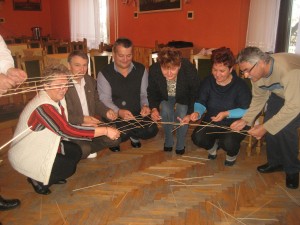 Training of councilors.
Training of councilors.
Program designer, trainer of trainers and trainer, Hunagrian Association of Local Governments, 2010
In the frame of a cooperation between the Hungarian and Norwegian Association of Local Governments I am responsible for the elaboration of a training for the new councillors who will be elected in autumn. The program will develop a training program, and train a first group of 40 trainers to deliver the trainings for the newly elected assembly members. The as-sembly members of one local government will be trained together. Training will help the participants to acquire the requisite knowledge, the appropriate attitude and the necessary skills that are required to foster decentralisation and make municipal ad-ministration and management a success. My role was to design the training program and train the first group of trainers and train some newly elected assemblies.
Resolution of local conflict caused by regulatory changes.
Mediator, 2009-2010
The local government initiated the conflict resolution process in a prospering medium size Hungarian city where the rezoning of a housing area had triggered violent opposition of various civil soci-ety groups. The process we led conveyed all stakeholders involved or affected by the conflict. We assisted the stakeholder groups to organize their effective representation and mediated the negotiation process that led to partial agreements. As a result of these agreements the stakeholders could define the scope of information gathering and analysis needed for a final agreement, expected to be discussed in a couple of months.
Analysis of the distribution of public financial support (subsidies) for national minority associations
Analyst, Council of Europe, Committee of Experts on Issues Realated to the Protection of National Minorities, 2010
The analysis was prepared for the Committee of Experts on Issues Relating to the Protection of National Minorities of the Council of Europe. The analysis was executed on the basis of a questionnaire filled up by 22 countries. On the basis of the information presented by the countries it ana-lyzed actual financing schemes and the underlying approaches. The paper also discusses what kind of impacts the given financial arrangements can exercise to the self representation and identity preservation/building of the national minorities
Support of Local Leadership in Roma Integration
Lead expert, Open Society Institute and Hungarian Association of Local Governments, Hungary, 2010
The project applies the Peer Review methodology of the Council of Europe whose Hungarian adaptation and introduction I supported during the previous years. A group of experts conducts a systematic analysis of the local government leadership and management, but the focus in this project is not general assessment as in the original method, but the possibility to foster Roma integration in the locality, The task of the peer team is to identify the specific interventions supporting Roma integration that seem to be possible in the actual conditions. Instead of pushing “supply driven” projects, the team focuses on what seems best and feasible in the given context. A series of peer reviews will lead to a study that will attempt to draw some more general conclusions from the common filed experiences and offer some suggestions for donors involved in the domain of Roma integration. My role was to elaborate the project concept and lead the implementation as lead expert.
Peer Review of local governments
Lead expert for Council of Europe and Hungarian Association of Local Governments, Hungary, 2009
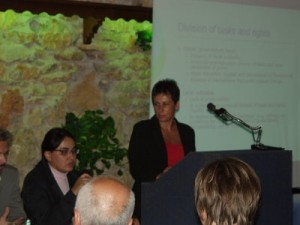 Peer reviews are systematic analysis of the local government leadership and management in a locality, conducted by a team of experienced local government decision makers and experts form other localities (the peers), according to a CoE methodology. The peer review process provides the evidence from both documents and stakeholders on the basis of which an assessment can be made. The focus of the assessment is on the corporate leadership and management of the local authority rather than the detailed operations of individual services. On the basis of the assessment the peer team supports the local government to draw up and implement an Improvement Plan. Ms Pallai, who has already assisted many other countries in the implementation of the program, has guided the work of the adaptation of the benchmark system and work methodology, and led first peer reviews in Hungary.
Peer reviews are systematic analysis of the local government leadership and management in a locality, conducted by a team of experienced local government decision makers and experts form other localities (the peers), according to a CoE methodology. The peer review process provides the evidence from both documents and stakeholders on the basis of which an assessment can be made. The focus of the assessment is on the corporate leadership and management of the local authority rather than the detailed operations of individual services. On the basis of the assessment the peer team supports the local government to draw up and implement an Improvement Plan. Ms Pallai, who has already assisted many other countries in the implementation of the program, has guided the work of the adaptation of the benchmark system and work methodology, and led first peer reviews in Hungary.
Management of Urban Change in Transition cities – Summer university course
Course designer and director for international audience, Central European University, Hungary, 2009
The summer university is organized for an international audience of academics and decision makers who come form various World regions. In order to exploit the diversity of backgrounds and experiences the course is led in a highly interactive manner creating a balance among components that are knowledge pieces, field visits, practical exercises and discussions. The main areas covered during the course are Sustainable communities, Strategic development planning, Urban planning, Participatory processes, Area based development, Territorial Conflicts and their management, Real estate markets, Horizontal and vertical coordination in development planning. www.ceu.hu/sun
Community mediation in Csobánka
Mediator for IRM, Hungary, 2009
Csobánka is a multi-ethnic settlement in the agglomeration of Budapest with approx. 3.000 inhabitants and five ethnic groups. In Csobánka cohabitation was peaceful till the 1990s. The settlement had one school attended by all ethnic groups. In the 1990s people from Budapest started to settle in the town situated in a beautiful natural setting. By today the size of the town has tripled with the new comers, but community life has disintegrated and the local school became completely segregated (attended only by Roma children). The mediation assisted the community to create constructive dialogue in order to desegregate the school, revive community life and relations, and establish the institution that can maintain the dialogue established during the project.
Facilitating better local governance of oil revenues for improved economic and social development – Training and coaching
Consultant/trainer/coach of local team for LGI/Revenue Watch, Peru, 2009
This project aims to assist local governments, the Association of Local Governments and NGOs in Peru to avoid the resource curse by working at the local level to advocate for extractive revenue transparency; providing technical assistance and capacity building to stakeholders and helping to establish participatory local planning and budgeting processes; and strengthen civil society and citizens to monitor government service delivery effectively. Ms Pallai’s task is capacity building for the participatory planning process, advising the process design for governmental organizations and NGOs who lead the process. www.lgi.osi.hu
Ethnic Diversity, Community Conflict and Urban Development – Training course
Course designer and trainer for international audience Local Government Initiative of the Open Society Institute Hungary, 2009
The training was designed and delivered in multiple occasions by Ms Pallai together with Ana Vasilache of FLDP. After the introduction of the key concepts related to the management of ethnic diversity, the possible impact of ethnic diversity was discussed on the application of various policy development, strategic planning and conflict management approaches. The course concluded with application exercises where participants could develop strategies to establish inclusive local public policy-making, urban development planning processes in multiethnic communities. www.lgi.osi.hu
Local Development Planning in context of Extractive Industries
Expert on planning for LGI/OSI and Revenue Watch Institute, International cooperation, 2009
Revenue Watch Institute and the Local Government and Public Service Initiative of the Open Society Institute has launched a project to assist local NGOs in various countries to establish multi-stakeholder processes to strengthen transparency extractive revenues of government and planning processes; and establish local participatory planning processes that assist local governments in effective spending of extractive revenues. Ms Pallai’s task is to elaborate a planning methodology that accommodates all specificities of the extractive industry context into the development planning process and can be adapted to fit the different national regulatory frameworks. www.lgi.osi.hu
Managing Conflict and Urban Development in Multi-ethnic Communities – Training course
Course designer and trainer for international audience Local Government Initiative of the Open Society Institute, Hungary, 2009
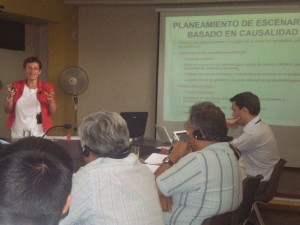 The training was designed and delivered by Ms Pallai together with Ana Vasilache of FLDP. It discussed the main concepts related to diversity, identity and ethnicity, stereotypes, discrimination and ethnic conflict. It discussed public policy formulation, urban development planning and and participation as vechicles for conflict resolution in multiethnic communities. It increased participants’ capacity to analyze conflict situations in multiethnic communities resulting from urban development policies/decisions and (b) identify and use the appropriate strategies in order to manage these situations, such as principled negotiation, multiparty mediation and facilitation of participatory processes. The trainings goal was to deepen participants’ understanding about inclusive local public policy-making, in the field of urban development in multiethnic communities. www.lgi.osi.hu
The training was designed and delivered by Ms Pallai together with Ana Vasilache of FLDP. It discussed the main concepts related to diversity, identity and ethnicity, stereotypes, discrimination and ethnic conflict. It discussed public policy formulation, urban development planning and and participation as vechicles for conflict resolution in multiethnic communities. It increased participants’ capacity to analyze conflict situations in multiethnic communities resulting from urban development policies/decisions and (b) identify and use the appropriate strategies in order to manage these situations, such as principled negotiation, multiparty mediation and facilitation of participatory processes. The trainings goal was to deepen participants’ understanding about inclusive local public policy-making, in the field of urban development in multiethnic communities. www.lgi.osi.hu
Public policy in Multi-ethnic Communities – Training course
Course designer and trainer for international audience, Local Government Initiative of the Open Society Institute, Hungary, 2008
Within the frame of the Managing Multi-ethnic Communities Program, Ms. Pallai together with Zsuzsa Katona designed and presented a training program that discussed the key issues related to the integration of ethnic diversity in the local policy process. The training had an awareness raising component focused on issues related to ethnic diversity, identity, formation, stereotyping, discrimination and the need for diversity management. The policy related component discussed policy development as an encounter among groups conditioned by past experiences, and discussed key impacting factors, like biases, representation, communication and problem definition. www.lgi.osi.hu
Economic Opportunities for the Greater Tirana Region – Technical assistance
Consultant for Local Government Initiative of the Open Society Institute, Tirana, Albania, 2008
In the frame of the project the Municipality of Tirana initiates public dialogue with other local governments and stakeholders within the Greater Tirana Region in order to set up systematic data collection and analysis for local economic development policy making. The project prepares the ground for substantial dialogue on a development strategy for the conurbation. Ms Pallai’s role in the project is to advise process design in order to secure effective participation of stakeholders and substantial transfer of knowledge between the international experts and the local team. www.lgi.osi.hu
Facilitating better local governance of oil revenues for improved economic and social development – Training and coaching
Consultant/trainer/Coach of local team for LGI/Revenue Watch , Indonesia, 2008-ongoing
This project aims to assist local governments in Indonesia to avoid the resource curse by working at the local level to advocate for oil revenue transparency; providing technical assistance and capacity building to stakeholders and helping to establish participatory local planning and budgeting processes; and strengthen civil society and citizens to monitor government service delivery effectively. Ms Pallai’s task is capacity building for the participatory planning process, advising the process design and implementation, and training and coaching the NGOs who lead the process. www.lgi.osi.hu
Participatory process design and institutional scheme design for Budapest – Technical assistance
Adviser/expert for Studia Metropolitana, Hungary, 2008
The Municipality of Budapest initiated a process for renewing the city strategy elaborated in the 1990s under the leadership of Ms. Pallai. Ms. Pallai was invited to advise the design and organization of the participatory process supporting the new city strategy drafting and the institutional scheme that could evolve for the monitoring and up dating.
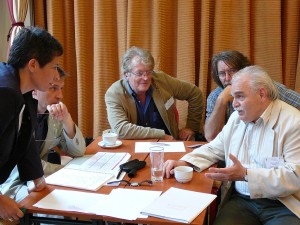 Strategy workshop – Master-course on local leadership – Training
Strategy workshop – Master-course on local leadership – Training
Course designer and trainerfor F 38 Ltd. and Urbanissimus, Hungary, 2007-2008
The workshop is a private initiative of Ms Pallai. The goal is to propagate and facilitate the application of governance approaches to local leadership and participatory city strategy processes. With interactive adult learning methodology, the workshop urges local leaders to reflection on their leadership approaches, practices and possibilities. The program consists of a series of two days events where participants learn about new approaches and cases studies and appropriate the new knowledge through guided discussions and application exercises. The program was first organized in 2007 with the participation of 16 Mayors and some appointed leaders of important Hungarian settlements. Since, as a response to the demand expressed, it has been twice repeated for the colleagues of the alumni and for leaders of other local governments.
Serving the Public – Responding to Challenges of Promoting Social Justice through Local Public ServiceDelivery in Wider Europe, Workshop designed and delivered by Petra Kovács and Katalin Pallai, Hungary (2008)
Course designer and trainer for Open Society Institute – LGI, Hungary, 2008
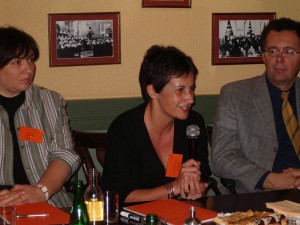 This innovative, international workshop aims to assist mayors and other senior decision-makers in local governments and public administrations from Central and South East Europe to design and implement local service delivery policies that conform to European standards of social integration. The workshop seeks to promote change in approaches to policy development and emphasize the role of governments in creating more just and inclusive societies. www.lgi.osi.hu
This innovative, international workshop aims to assist mayors and other senior decision-makers in local governments and public administrations from Central and South East Europe to design and implement local service delivery policies that conform to European standards of social integration. The workshop seeks to promote change in approaches to policy development and emphasize the role of governments in creating more just and inclusive societies. www.lgi.osi.hu
Public Management of Urban Change in Transition Cities, organized by the SUN Program of the Central European University (2008)
Designer and course director for Central European University – SUN, Hungary, 2008
The course is a new version of earlier local strategy courses designed by s.S Pallai for the CEU- SUN program. This version takes a new approach and content. The content is exclusively focused on the city strategy process: it discusses the urban strategy, policy and physical planning process, the strategy design options and tools, examples of city and area strategies, and stakeholder involvement. The teaching method is based on new approaches of adult learning. www.ceu.hu/sun
Best Practice Program
Expert for Council of Europe, Hungary, 2008-ongoing
This project enables the identification of local authorities demonstrating best practices in key areas of their responsibilities. These local authorities are provided with support in order to enable them to share their best practices with others. In Hungary the Hungarian Association of Local Governments (TÖOSZ) is the partner of the Council of Europe. As a council of Europe expert, Ms Pallai, who has already assisted many other countries in the implementation of the program, oversees the process of adaptation, and advices and supports the implementation of the program. In the frame of the program she also leads trainings for the best local governments on presentation skills, and supports them in planning and implementing the dissemination of their practices.
Leadership Benchmark Program
Consultant and trainer, Council of Europe, Hungary, 2007-ongoing
The Council of Europe’s ‘Benchmark of an Effective Democratic Local Authority’ sets out a set of criteria that define the characteristics of more effective and less effective local authorities in terms of both their leadership, service provision and community engagement. The Leadership Benchmark Program enables a local authority to first assess itself against that Benchmark with help from a ‘Peer Review Team’, and then, on the basis of that assessment, draw up an Improvement Programme for building on its strengths, exploiting opportunities, and tackling its weaknesses – that is, for achieving the Benchmark standards. Ms Pallai is involved in training and supporting mayors, senior local decision makers and civil servants participating in the program.
City Strategy for Belgrade
OSI/LGI adviser, Belgrade, Serbia, 2007
Technical assistance since 2006 and expert team has been working on the elaboration of a City Strategy for the City of Belgrade. Ms Pallai was invited by the team and the city to advise on the strategy development process and on the formulation of the strategy. www.lgi.osi.hu
Best Practice Program
Expert for Council of Europe, Macedonia and Montenegro, 2007-ongoing
This project enables the identification of local authorities demonstrating best practices in key areas of their responsibilities. The Council of Europe works with the Local Government Asssociations, who organize the process of competition for the practices and support the local authorities to enable them to share their best practices with others. As a council of Europe expert, Ms Pallai, oversees the process of adaptation, and advices and supports the implementation of the program. In the frame of the program she also leads trainings for the best local governments on presentation skills.
Policy development and advocacy trainings
Designer and trainer for ISSA, Kosovo, 2007
The project offered a series of highly interactive and practical trainings for NGOs on policy development and advocacy. The trainings were designed and delivered by Ms Pallai. The trainings improved participants’ understanding of the policy process, stakeholder analysis and policy development; taught approaches for mapping the context and alternatives; and enhanced skills needed for effective policy development and advocacy.
Policy presentation training
Designer and trainer for Council of Europe, Various countries of SEE, 2007-ongoing
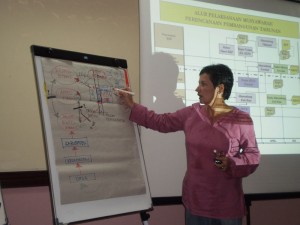 Trainings, designed and delivered by Ms Pallai offered introduction to policy development and policy presentation for local governments. Participants improved their understanding of policy development and improved their skills related to effective presentation of policies to decision makers. The training encouraged a shift from the traditional “anecdotal style” of policy communication to a concise, evidence-based and argumented approach in a highly interactive and practical training format.
Trainings, designed and delivered by Ms Pallai offered introduction to policy development and policy presentation for local governments. Participants improved their understanding of policy development and improved their skills related to effective presentation of policies to decision makers. The training encouraged a shift from the traditional “anecdotal style” of policy communication to a concise, evidence-based and argumented approach in a highly interactive and practical training format.
Power sharing in Multi-ethnic Communities – Training course
Designer and trainer for LGI, Hungary, 2007
Within the frame of the Managing Multi-ethnic Communities Program, Ms. Pallai together with Petra Kovacs designed and presented a training program that discusses power sharing possibilities at the local level. The course is specifically targeted for leaders of multi-ethnic communities. It puts power sharing in the context of participatory arrangements and offers both conceptual underpinning and technical skills for designing power sharing arrangements. www.lgi.osi.hu
Strategic Approach to Governance at the Local Level – The New Paradigm
Team leader for LGI and Urbanissimus, Hungary, 2006-2007
Ms. Pallai recruited a team of leading decision makers and senior local government management and development professionals to elaborate approaches to local governance that are applicable in the CEE context. Ms. Pallai also designed a series of workshops for senior practitioners where the team presented their conclusions – the new paradigm. Added value of the project was to produce innovations for post-communist transformation of local government management and local strategic planning processes that could be applicable in the SEE and fSU regions. www.lgi.osi.hu
Spatial Analysis in Addressing Vulnerable groups
Mentor of research fellows for LGI, Hungary with CEE and SEE regional outreach, 2006-ongoing
The purpose of the LGI Fellowship program is to conduct policy research aimed at stimulating innovative and practical policy reform. As Mentor Ms. Pallai supports talented policy experts from the CEE and SEE region. Fellows study the spatial clustering of vulnerable groups, public services and various opportunities for improving life conditions of these groups. Based on the analysis of local policies and the misfits of needs and opportunities, fellows, with the support of the mentor, elaborate practical policy recommendations for local authorities with regard to intervention strategies to address pockets of vulnerable groups. www.lgi.osi.hu
Strategic Planning and Management Capacity Building for High Ranking Civil Servants
International expert for Ramboll on EU Project, Romania, 2006-2007
Ms. Pallai was commissioned to design a strategic planning and Management training program for High Ranking Civil Servants, train Romanian trainers to present the course and supervise the training of 150 officials. The training is built on the experimental learning cycle, leading trainees through a series of experiences with strategic methods and facilitating the drawing of conceptual conclusions.
Local Government Capacity Building
Key Expert for ICON on EU Project, Croatia, 2006
The project assisted the Croatian government and local governments to (1) execute a comprehensive Training Needs Assessment; (2) elaborate the National Training Strategy for the life-long education of local civil servants; (3) accomplish the foundation of a Local Democracy Academy and (4) train the Academy’s core staff. The Key expert was responsible for managing and leading this whole process.
Service delivery in Multi-ethnic Communities – Training Program
Designer and trainer for LGI, in Hungary for international audiance, 2005-2008
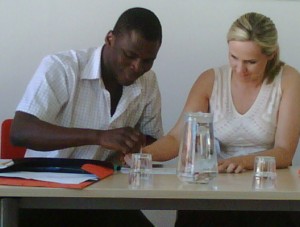 This was a multi year program where Ms. Pallai together with a co-trainer designed and presented a service delivery training program specifically targeted for leaders of multi-ethnic communities. The participants analyzed the typical conflicts resulting from the application of mainstream concepts for service delivery within multi-ethnic environments, and discussed approaches for service delivery from the angle of taming or managing these conflicts. It encouraged leaders to think out of the box of standard mainstream solutions and make an effort to design policies that can accommodate local diversity and the tensions among various groups having different histories, capabilities and identities. www.lgi.osi.hu
This was a multi year program where Ms. Pallai together with a co-trainer designed and presented a service delivery training program specifically targeted for leaders of multi-ethnic communities. The participants analyzed the typical conflicts resulting from the application of mainstream concepts for service delivery within multi-ethnic environments, and discussed approaches for service delivery from the angle of taming or managing these conflicts. It encouraged leaders to think out of the box of standard mainstream solutions and make an effort to design policies that can accommodate local diversity and the tensions among various groups having different histories, capabilities and identities. www.lgi.osi.hu
Localizing Sustainable Development
Evaluator for UNDP, Various countries, 2005
A more than two years long mega-project on more than 1,5 million USD budget that assisted local governments in eight post-communist countries to develop local strategies. The evaluation was conducted after the project ended and it had to evaluate results and propose potential follow up activities.
Strategic Planning as City Leadership and Management Tool, organized by UNDP Montenegro
Designer and course director for UNDP, Montenegro, 2005
The program supported local decision makers in developing their leadership skills based on better strategising, an approach that serves the new governance paradigm of public management. It offered an integrated approach to community leadership, strategy, participation and communication – tools and practices to encourage and steer community efforts. All local governments of Montenegro participated in the two rounds of the training with representation by the mayor and/or some chief executives.
Strategic Approach to Urban Challenges, organized by the Summer University Program of the Central European University
Course designer and director for Central European University, Hungary with CEE and SEE regional outreach, 2004-2007
The course two weeks long course is designed for PhDs and university faculty who teach similar subjects or intend to design courses with strategic planning and management component. The course presents approaches to strategic planning and management and discusses the specific application challenges in the public sector. It builds a clear conceptual framework to design and assess strategies and uses exercises and cases studies from the region and beyond to illustrate the concepts presented.
National Human Development Report on Local Governance for Bosnia and Herzegovina
Team leader for UNDP, BiH, 2004-2005
The publication of the NHDR on Local Governance produced the first systematic analysis of the condition and prospects of decentralization in BiH. Its publication coincided with Public Administration and Municipal Reform in BiH that gave a special importance for this review and the policy inputs it provided. Ms Pallai’s role was to lead the team of local experts and to lead wide consultation with decision makers at various levels of governments and with other stakeholders and on the basis of results to elaborate the final form of the report. The document was aimed to impact the work of parliamentary committees, legislators and local decision makers, and equally to influence public debate on decentralization. Its result were expected to offer a conceptual basis for further legislative drafting on local governance.
USAID-GRASP Program in Romania
Senior Policy Reform Director for DAI for the USAID sponsored GRASP project, Romania, 2003-2004
Governance Reform and Sustainable Partnerships (GRASP) was a five years USAID-funded program designed to strengthen Romanian local governance and civil society capacity. The objective of Ms Pallai’s assignment was to provide overall coordination and guidance for the GRASP policy reform program, so as it could lead to substantive professional support for the Romanian decentralization process. Within this work Ms Pallai assisted the Romanian government in the development of the Public Administration Reform Strategy for the EU Accession (adopted in 2004); supported the Association of Local Governments to develop policy position documents; assisted the government to establish a donor coordination mechanism; and lead the development of various policy papers.
Local Economic Development Program
Expert and trainer for IFC & OSI/LGI, Kosovo, 2002
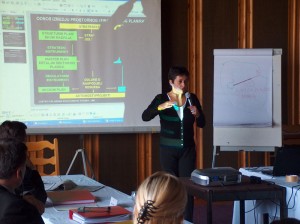 The project is a pilot training programme for municipal officials in Kosovo, run in co-operation World Bank, IFC and OSI/LGI. The goal of the project is to support members of local governments and community based NGOs to provide leadership role in creation of enabling environment for SMEs. The program assisted selected local governments in Kosovo to set up multi stakeholder groups for participatory Local Economic Development Planning. It offered training and technical assistance to the local governments and multi stakeholder groups, and trained project staff to lead the process and be capable to maintain the dialogue after the end of the project. Ms Pallai was invited to to contribute to the Local Strategic Planning component of the project training the local teams.
The project is a pilot training programme for municipal officials in Kosovo, run in co-operation World Bank, IFC and OSI/LGI. The goal of the project is to support members of local governments and community based NGOs to provide leadership role in creation of enabling environment for SMEs. The program assisted selected local governments in Kosovo to set up multi stakeholder groups for participatory Local Economic Development Planning. It offered training and technical assistance to the local governments and multi stakeholder groups, and trained project staff to lead the process and be capable to maintain the dialogue after the end of the project. Ms Pallai was invited to to contribute to the Local Strategic Planning component of the project training the local teams.
www.lgi.osi.hu
Faculty, Core Course On Intergovernmental Finance and Local Financial Management, organized by WBI
Faculty member of World Bank Institute, Various countries, 1993-2004
Faculty, teaching different subjects on various occasions and in various country presentations of the core course of WBI in countries that were in transformation form command to market economy and democracy. In this position Ms Pallai worked in Kazashtan, Armenia, Kyrgyzstan, Ivory Cost, Turkey, and participated in international events and training courses organized for the CEE and SEE region.
Planning and Financing Cities in Transition: The Strategic Approach, organized by the World Bank Institute and the Local Government and Public Policy Initiative of the Open Society Institute
Course designer and director for World Bank Institute and Local Government Initiative, Hungary with CEE and SEE regional outreach, 2003-2004
The course was a ten-day executive training course, jointly developed by the World Bank Institute and LGI. The course presented an integrated approach to meet urban challenges. It showed how urban development and financing strategies can and should be integrated in the overall urban strategy and its implementation. It used exercises and it built on various cases studies from the region and beyond to illustrate the concepts presented. Ms Pallai was commissioned to design the course and direct it. www.lgi.osi.hu
Romanian Government Strategy – Decentralization and Fiscal decentralization chapter
Team Leader for DAI for the USAID sponsored GRASP project, Romania, 2003
The project assisted the Romanian government in updating its decentralization strategy by preparing the chapters on Service Delivery Decentralization and Fiscal Decentralization presented at the meeting between the government and EU representatives. Ms Pallai was invited to lead the expert group responsible for the drafting of this document and produce the final product. The document that the project produced was the basis of the public debates on the Public Administration Reform Strategy for the EU Accession.
Revision of the Local Government Law and Law on the Capital City, Skopje, Macedonia
Consultant for Urban Institute and DAI on USAID sponsored projects, Macedonia, 2000-2001
Working on a USAID contract within Macedonia; first with the Urban Institute, and later DAI, Ms Pallai offered technical assistance to the Ministry of Local Government in support of its lead role in implementing the Government’s Strategy for Reform of the System of Local Self-Government. Ms Pallai was also invited repeatedly on short term assignments years by both organizations to contribute to the preparatory work on revisions to the Local Government and the Capital City Laws.
Local Government Reform and Law Program
Expert and trainer for USAID& Urban Institute, later DAI, Macedonia, 2000-2001
In Macedonia on a USAID contract first the Urban Institute, later DAI offered technical assistance to the Ministry of Local Government in support of its lead role in implementing the government’s Strategy for Reform of the System of Local Self-Government. Ms Pallai was invited repeteadly on short term assignments during the last years by both organizations as of “an expert with extensive experience in the reform of intergovernmental fiscal systems in the transition countries of Central and Eastern Europe in general and experiences of capital cities in particular. She contributed to the work on revision of the Local Government role and the Law of the Capital City.
Center for Policy Studies
Director for Central European University Managing, Hungary, 2000
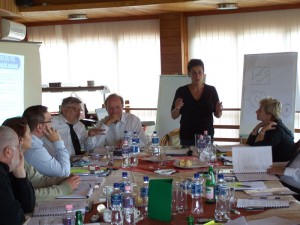 The Center for Policy Studies was created to improve the policy environment in the region by promoting the development of policy centers, improving professionalism of practitioners and analysts, stimulating and conducting quality research in strategic areas and diversifying the sources of public policy input. As a managing director Ms Pallai’s responsibility was the setting up and the start of functioning of the Center and the development of the first strategy and action plan.
The Center for Policy Studies was created to improve the policy environment in the region by promoting the development of policy centers, improving professionalism of practitioners and analysts, stimulating and conducting quality research in strategic areas and diversifying the sources of public policy input. As a managing director Ms Pallai’s responsibility was the setting up and the start of functioning of the Center and the development of the first strategy and action plan.
The Center was also initiated the introduction of public policy education to the university by planning an accredited Public Policy Masters Program and a department for Public Policy at the Central European University. After this challenge was accomplished she withdrew to her preferred role of a consultant.
CEE of the World Bank Institute Urban and City Management course
Course director and adapter for World Bank Institute and Local Government Initiative, Hungary with CEE and SEE regional outreach, 1999-2001
The Urban Management course was a two-three weeks long executive training program that aimed to assist decision-makers and practitioners in designing and implementing better urban policies through: (1) deepening the understanding of the complexity of urban issues confronting the region, and (2) exposing the participants to new strategies, tools and practices to effectively address these issues. Ms. Pallai was commissioned by WBI to adapt the WBI core course for the needs of post-communist transition cities and direct the courses organized in the region.
Urban Development Strategy and Program for Budapest
Chief Planner and Project Manager (with Ivan Tosics) for Municipality of Budapest, Hungary, 1995-2001
The concept is the first attempt to establish a comprehensive Strategic Plan for the Hungarian capital. The work is to plan, guide and coordinate the process of Strategic Planning. This means both the coordination of the work of experts and the planning and guiding of the participatory process. The team of the Strategic plan is established by leading Hungarian experts of all related fields whose work has to be harmonized and the results must be built into a strategic plan that establishes the synergetic relation among interventions. Besides it is also the responsibility of the chief planners the production and commissioning of all materials to be published during the process. Ms Pallai led the work with Ivan Tosics.
Development Program for the Central Hungarian Region
Lead planner for Consortium, Hungary, 1999-2001
The Regional Development concept is the regional input to the National Development Strategy required for the access for the EU pre-accession funds. Consultants in the team are delegated by different stakeholders and their job is the harmonization of interests and the elaboration of a comprehensive development strategy and different development project proposals for political decision. In the team Ms Pallai works as the delegated expert of the Municipality of Budapest. Ms Pallai was lead palnner together with Ivan Tosic and Peter Gauder.
Counsellor to the Mayor of Budapest
Counsellor for the Office of the Mayor of Budapest, Hungary, 1991-2001
Between 1991 and 2001, as a freelance expert, she has been working directly for the Mayor and for his expert team. She was a participant in the drafting and implementation of the urban policy reforms in Budapest. Several times she led expert teams drafting various comprehensive urban policy documents for Budapest. She has been chief planner and project director of the elaboration of the major urban policy concepts during the 1990s (1991, 1994, 1998) and was also active in the Project Coordination Board of the City between 1994 and 1998. Ms. Pallai’s other task was to advise the Mayor’s Office on inputs to legislative drafts, issues related to regional development and advise the representation of the Municipality on different regional and developmental boards. She was author of various publications of the Mayor’s office that presented the policy concepts and results planned and achieved. In 2003-4 she edited and partly wrote a book on the history and analysis of the twelve years of the municipal reform process in Budapest.
Development Program for the Budapest Agglomeration
Chief planner for Consortium, Hungary, 1998-1999
Ms Pallai was the chief planner with Ivan Tosics. They led the team of experts that was commissioned to elaborate the first development program for the Agglomeration of Budapest, after it has been established as an administrative area. The work on the development concept for the agglomeration of Budapest was to plan, guide and coordinate experts of different related sectors and plan and guide the related participatory process. The task was to harmonize the results from different policy fields and build them into a strategic plan that establishes the synergetic relation among interventions and be responsible for all related publications and communication.
Establishment of the Regional Development Council for the Central Hungarian Region
Negotiator for the Municipality of Budapest, Hungary, 1998-1999
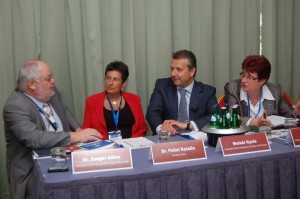 Before the establishment of EU conform regions in Hungary a team of experts was establish to prepare the setting up and elaborate proposals for the later functioning and activity of the Regional Development Council. The task of the working team was to build consensus among delegated members and to elaborate a proposal for the mission, broad strategy, organizational structure and management scheme of the new Regional Council. Ms Pallai was member of the negotiating team from the part of the Municipality of Budapest in the negotiation process with partners during the establishment of the Regional Development Council for the Central Hungarian Region.
Before the establishment of EU conform regions in Hungary a team of experts was establish to prepare the setting up and elaborate proposals for the later functioning and activity of the Regional Development Council. The task of the working team was to build consensus among delegated members and to elaborate a proposal for the mission, broad strategy, organizational structure and management scheme of the new Regional Council. Ms Pallai was member of the negotiating team from the part of the Municipality of Budapest in the negotiation process with partners during the establishment of the Regional Development Council for the Central Hungarian Region.
Reform of Budgeting of Hungarian Local Governments
Expert and trainer for USAID, Hungary, 1996-1999
The training program was organized for Hungarian municipalities who aimed to introduce program budgeting. Officials from these municipalities received a year long training consisting of general education on planning and budgeting and of assistance in the introduction of the first program budgets. Ms Pallai’s role was to teach strategic and general planning, decision making tools and explain the relation of comprehensive, sectoral and financial planning.
Medium Term Urban Policy Concept and Program For the Municipality of Budapest
Lead expert for the Office of the Mayor of Budapest, Hungary, 1993-94
This urban policy concept focused on the reform of the service delivery and interior management of the local government. It laid down the basis for the reforms accomplished within the Municipality during the second election term and it became the basis of the work program of the ruling coalition. Ms Pallai was Head of Project Team (with József Hegedüs and Ivan Tosics).
Medium Term Urban Policy Concept and Program For the Municipality of Budapest
Chief Planner for Municipality of Budapest, Hungary, 1993-94
This urban policy concept focused on the reform of the service delivery and interior management of the local government. It laid down the basis for the reforms accomplished within the Municipality during the second election term and it became the basis of the work program of the ruling coalition. Ms Pallai was Head of Project Team (with József Hegedüs and Ivan Tosics).
Economics for Leaders Program
Adapter and trainer for FTE (Universtity of California), Hungary, 1993-1999
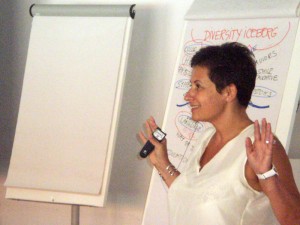 The program is a typical leadership training created for young adults that focuses on the development of personal skills in team building and builds capacities in team working. After a specific education received in the US Ms Pallai organized the Hungarian trainings and lead them as the trainer of the program.
The program is a typical leadership training created for young adults that focuses on the development of personal skills in team building and builds capacities in team working. After a specific education received in the US Ms Pallai organized the Hungarian trainings and lead them as the trainer of the program.
Program of Mayor Demszky, Urban Policy Concept for the Municipality of Budapest
Chief Planner for the Municipality of Budapest, Hungary, 1991
The Program of the Mayor was the first comprehensive policy document after the political transition and the establishment of the local governments. It attempted to rethink the future roles and actions of the local government and envision the strategy it can follow. It was the task of the managers of the program to recruit the experts, based on their work elaborate the policy proposals and develop the major points of the first strategy of the newly independent Municipality.
